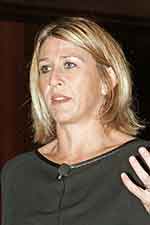News
Specialty Coffee Expert Reviews Changing Consumer Tastes
Mary Dusenbury Today's workplace service operators are striving to comprehend the swift rise to prominence of employee populations with preferences markedly different from those of the past. This change, of course, is not limited to consumers at work; the whole coffee industry is endeavoring to adapt. The current market was analyzed by Mary Dusenbury, senior director of planning and strategy for Peet's Coffee (Emeryville, CA), in a seminar at the recent Coffee, Tea & Water conference presented by th...
March 19, 2018
 |
| Mary Dusenbury |
"We're in the Bay area," Dusenbury explained. This is the center of the booming technology industry, so Peet's has worked with the consumers who are leading this dramatic shift.
"I'm not a millennial," she observed. "They often have different perceptions. For example, health consciousness today is a lifestyle choice and a status symbol, and this has promoted the rise of services such as fitness clubs . Seventy-three percent say that they are making healthier choices than they used to - and they also influence their parents." One characteristic of this new sensibility is important for food and beverage purveyors to understand: "They read the label," she emphasized.
Another trait that is especially prevalent among members of the rising generation is "tribal affiliation," the speaker continued. "They look for friends - and workplaces - with values similar to theirs." Those friends, and employers, favor "social justice" and are concerned about the environment, so the new wave of consumers will buy from suppliers with similar sentiments.
New Demands
"And they demand quality rather than quantity," Dusenbury continued. "They want organic, sustainable, 'craft' products. They value experience and discovery. In their free time, away from their computer screens, they will pay for experiences. And so they want to see how their beverages are made.
"We speak with purveyors like you," the speaker reported. "The workplace is an environment where you can display your company." And those favored employers recognize the value of a symbolically appropriate breakroom. "Airbnb offers 'collaboration spaces' which are mini branded areas, based on their members around the world. They're in Johannesburg, South Africa and in Brooklyn, NY. They appeal to small companies with few workers that require little space, but they paid a designer to conceive a breakroom for what, essentially, is a large closet. The idea is to convey their values."
One problem facing employers - and many others besides - is that today's employees are consumers with tremendous amounts of information available at their fingertips, Dusenbury pointed out. "How do you engage, attract and retain them? If you're an employer, enhancing the employee experience is a way to do it. Human resource leaders are looking at this, starting to view the building and the brand as a unit, a cohesive experience."
Employment perquisites that appeal to contemporary employees include healthcare benefits, access to wellness products and services, amenities like laundry and carwash services, concierge services, educational opportunities and family benefits. "What we're seeing is the 'consumerization' of the workplace," the speaker summed up. "When the employee is seen as the consumer, workplace democracy ensues."
The "sharing economy," exemplified by companies like Uber and Airbnb, is based on people connecting with other people; it has opened a lot of minds, the Peet's executive observed. "For example, WeWork is a sharing workspace that offers collaborative spaces. This concept requires new ideas: if this is supposed to be an office, what should it look like? The answer seems to be 'somewhat homelike, with a coffee shop."
Buildings that house many shared spaces may make breakrooms available to tenants; this also is happening in apartment complexes, Dusenbury added; and employees are inclined to want the same products at work as they have at home. "Our coffee bars and foodservice clients want handcrafted espresso beverages, cold-brewed coffee, matcha (a powdered green tea), kombucha (a fermented tea beverage) and so on and on," she reported.
Peet's is a 50-year-old company that sells coffees sourced from the best growers, the speaker explained. "We treat them well, and we emphasize freshness. But we started losing consumers, so we adapted."
This began with thinking, and talking about, the company's values: authenticity and artisanship. "The next question was, how would we communicate them? We appointed a corporate accountability leader to coordinate this." An early component of the effort was emphasis on the functional benefits of products like ginger and turmeric, and on social responsibility values.
One result of this analysis was the establishment of the full-service Coldcraft distribution company to deliver the currently popular cold-brewed coffees. "We have a nationwide distributor network that gets our beans to grocery stores, so the structure is in place," Dusenbury explained.
Younger Patrons
Cold brew is regarded by contemporary consumers as "like a soft drink but more natural," she said; "and it's starting to change the way people begin to drink coffee - they'll start with cold brew, and then stay with hot."
Peet's has recognized that it can't implement its new approach all by itself. "Given today's 'tribal' demands, we're partnering with many suppliers like Mighty Leaf Tea (San Rafael, CA) and Revive Kombucha (Petaluma, CA). And we have relationships with designers," the speaker continued. "Many people don't want a 'fully-signed' Peet's coffee shop in their offices, so we offer custom design services to help integrate us and our partners into the workspace."
This is backed up by customer engagement programs including pop-up shops and cold-brew trucks, similar to food and ice cream vehicles, and even cold-brew bicycles.
Dusenbury then invited questions from the audience. "What's up with Peet's and Capital One Bank in Philadelphia?" was the first inquiry.
The speaker replied that this is a long-term relationship. "Capital One wants its banks to be community centers," she said, and Peet's Coffee, working with Aramark's LifeWorks restaurants, helps to accomplish this.
Another seminar participant said, "I'm a millennial, and I know that tastes change quickly. How can we keep up with that? And I really don't know how to provide cold-brew coffee profitably."
"You're right," the Peet's executive agreed. "We just have to keep developing products and putting them out there." Other audience members suggested rotating programs through locations to maintain interest - this has worked on college campuses - and having access to a wide variety of products that can be matched to the tastes of particular clienteles.
"As for cold brew, we have the same problem," Dusenbury continued. "You can do it; it becomes easier as volume grows. If you sell it packaged, there's a demand for smaller portions. If you sell kegs, the brewed coffee needs a nitrogen atmosphere in the bags and the dispenser needs a nitrogen line. And it has to be kept refrigerated." These factors impelled Peet's to set up the Coldcraft distribution system, she added; "it's been a huge challenge."
"Millennials want that keg and tap," another registrant observed, and Dusenbury agreed that these appliances contribute to the desired experience.
"And there is some resistance - reasonably enough - to giving all these products away for free," she remarked. "Cold brew is expensive."
"How do you justify the higher cost of cold-brewed coffee in your stores?" an audience member wanted to know.
"Cold brew requires more beans, and the process takes more time," the speaker pointed out. Cold brew also needs special handling from preparation to dispensing.
She added that, at present, the entire industry is grappling with the persistent difficulty of making a reasonable profit with cold brew. "It will get better; I envision the development of a more shelf-stable product," she said.
The next question turned back to conventional hot coffees. "New brands of coffee seem to emphasize a medium roast color," an operator noted. "Why do Peet's and Starbucks continue to favor dark roasts? Do millennials actually prefer medium-roast coffees, or are they simply responding favorably to a novel brand?"
The speaker replied that she has seen no information linking millennials with a preference for lighter roast colors, "but we are selling more medium roasts," she reported.
"Third-wave roasters seem to be differentiating their products by roast color," another registrant observed.
"And roasting darker tends toward a homogeneous taste," a fellow participant added. "The new emphasis on medium roast represents a revival of 'forgotten' coffee flavor variants like 'fruity.' This is a discovery for many new coffee drinkers."
"Yes, and millennials like that kind of experience," Dusenbury concluded.
 ChatGPT
ChatGPT Grok
Grok Perplexity
Perplexity Claude
Claude






